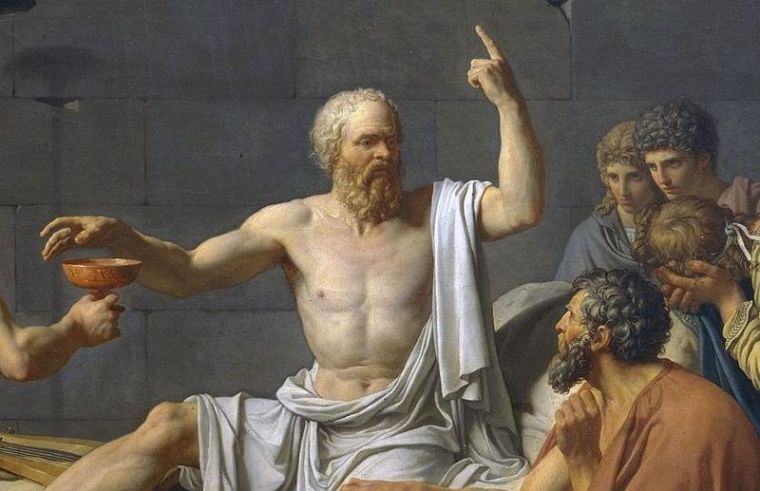I don’t envy Socrates. No, not only because he drank that horrific hemlock, but because I can’t imagine how difficult it must have been to play the role of a free speech advocate in his time. Talk about a tough gig. I imagine that Socrates might reiterate today in words something akin to these:
Welcome, habitués of the classical marketplace! We are here again, ready to dig into the philosophical problems of our time. And I proudly claim the moniker, “gadfly of the state,” for I reveal the foolishness of the supposed wise men of our society, and this especially includes myself.
This does not make a good sound bite today, and as we know, Socrates himself bit the dust because of his daring proclamations. But is our society that different? I’m not referring to the juvenile restrictions on free speech that are now prevalent in our universities. I’m talking about the false marketing which dominates the classical Christian homeschool movement, thus obscuring the true meaning of what it means to gain a classical education; I’m talking about what I call marketing hemlock. If you have a student who is in middle school or high school, and he or she signs up for a “classical” course in the humanities (online or otherwise) where the points of the course are “fed” to the student–that’s marketing hemlock. This poison must be counteracted by a bona fide classical pedagogy, wherein teachers/scholars are free to speak the truth about the state of classical education today, and wherein students are taught to think well enough to practice their right to free speech.

A classical approach incorporates the Socratic method, wherein instructors ask their students challenging questions, rather than lecturing them. Most teachers are terrified of “dead air time,” as the media people call it. You know–that silence in the room when no one says a thing, or has any response to a teacher’s inquiries. I understand that fear–I experienced it when I first began teaching. The problem is that if the teacher is insecure with the concept of “dead air time,” or, most likely, afraid of losing her job because silence will be interpreted by critics as incompetence, she will hesitate to practice the Socratic method. In short, the problem is with the pseudo-classical pedagogy that is peddled in much of the present home school/classical market. In 21st c. America, “results” are everything. You must have short term “provable” goals and objectives for every activity you conduct, in our utilitarian world. Those goals stand against the precepts of a genuine classical education, but more on that in another article. It may seem strange to connect silence in the classroom with free speech, but the Socratic technique is, in fact, the ultimate example of it, for the student is free to explore all thoughts out loud, without boundaries.
In the classes I teach, I force myself to wait. I – just—wait for the students to respond and interact, and they always do. Believe me, sometimes that can be awkward in an online classroom, but it always pays off in the end. I recently had a student from a last year– someone I’ve become friends with–tell me that she has missed this aspect of my class; she always looked forward to how she was going to be challenged, how she would be “put on the spot,” when she was in my class. That was encouraging and comforting to me, because teaching with a Socratic approach is an ongoing act of faith.
Sometimes in “classical” and homeschool marketing circles, teachers initially present themselves as Socratic, but revert to the regurgitation pedagogy prevalent in most schools. It’s so tempting. Teachers do this by opening the class session with thought  provoking questions, but then quickly turn to answering those questions themselves. I’m not saying that a teacher should never weigh in, but once a student gets to middle school age, in the humanities courses he or she should be constantly challenged to discover the answer by applying personal knowledge, worldview, and logic, before the teacher makes any pronouncements.
provoking questions, but then quickly turn to answering those questions themselves. I’m not saying that a teacher should never weigh in, but once a student gets to middle school age, in the humanities courses he or she should be constantly challenged to discover the answer by applying personal knowledge, worldview, and logic, before the teacher makes any pronouncements.
Most of the time, though, teachers are dedicated, sincere, and overworked. In the online homeschool “world,” many of the school owners use the manipulative techniques of the marketplace to draw parents into their web, using catch words which resonate with those of us who have read some classical works, convincing us that they have some secret we poor, ignorant parents don’t know about. (In fact, many of these owners are not classical thinkers, and indeed, have not read the canon of classical texts they market to us.) Meanwhile, the teachers who work for these schools must conform to the prevalent marketing mold in order to keep their jobs, even when they do not agree with it.
So, perhaps you are asking, “What exactly IS the Socratic method?” Most people know that it means to teach by asking questions and then engaging with the students’ responses, but – is that it? Yes and no. The teacher must come with a good understanding of the topic at hand, of course, not just a few questions. Even more, the teacher’s larger knowledge will  provide her with the ability to respond to the student’s comments with further questions. This is the challenging aspect of teaching in the spirit of Socrates. There is no “script” for what will happen next. It is also the exciting part of it: the environment which produces the “Aha!” moments that lead to independent thinking and genuine creativity.
provide her with the ability to respond to the student’s comments with further questions. This is the challenging aspect of teaching in the spirit of Socrates. There is no “script” for what will happen next. It is also the exciting part of it: the environment which produces the “Aha!” moments that lead to independent thinking and genuine creativity.
Some committed homeschool parents feel inadequate to teach their children. They shouldn’t believe this, because they have the very tools in their own hands which will lead their children to become independent thinkers: they themselves wish to learn and grow in their scholarship. For the most part, learning is “caught, not taught,” as the old saying goes, and a parent who develops the habit of engaging Socratically with his or her children is a good teacher.
Parents should trust themselves. If they have the need to outsource some classes, they should prayerfully seek out schools which appear to promote thoughtful, genuine learning, but be wary of the hucksters who haunt our American landscape. Within the Christian community, they are the new carpetbaggers, wolves in sheep’s clothing. Here are a few suggestions I have about how to try to distinguish between genuine online classical schools and those who are pretenders. These points apply to humanities courses:
- If a school claims that pre-recorded classes replace the live engagement of the “great conversation,” it is not classical school. (There may be times when you need to use pre-recorded “Self-paced” courses– that is understandable. Just don’t buy into the myth that a humanities course can be taught this way and still be genuinely classical.)
- If a school presents courses which are replicated, these are not classical courses. Independent thinking demands that each teacher (i.e. mentor) must interpret the information for him or herself. Of course, sometimes teachers use study questions and resources created by others–that is not necessarily a warning sign, but it could be. But when a humanities course is “canned,” it is not classical.
- If a school will not allow you to choose a particular teacher or allow you to personally engage with that teacher before you sign your student up for a course, you should have your spidey senses up.
Many parents, especially homeschool parents, feel intimidated by terms such as “Socratic learning,” “classical method,” “Rhetoric,” etc. They are tempted to defer to the “experts,” but often, they have no way of knowing if those who present themselves as scholars are, in fact, qualified to pass on a genuine classical education. As I said in a previous article, we are all products of our present dark age.

There are some wonderful teachers and schools out there, but there are also poseurs who, like the ancient sirens, lure people in with their empty promises. Unlike Odysseus, we are not caught between Scylla and Charybdis; however, each of us has a God-given mind and the parenting abilities to help us wisely determine our own family’s fate. Odysseus had to choose between two evils in the Straits of Messina, but we may choose the good–not to mention the beautiful.
Cindy C. Lange, MA
http://www.integritasacademy.com
